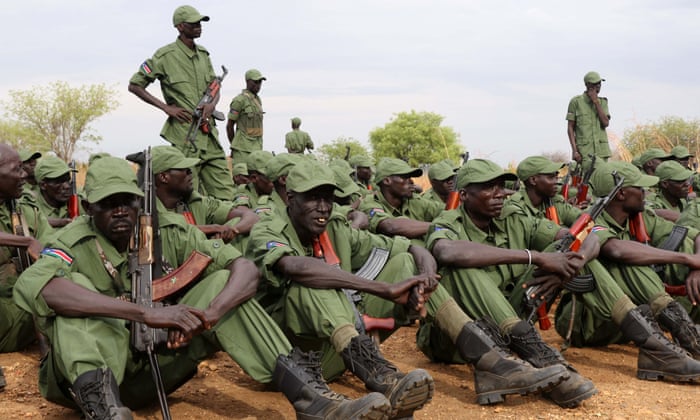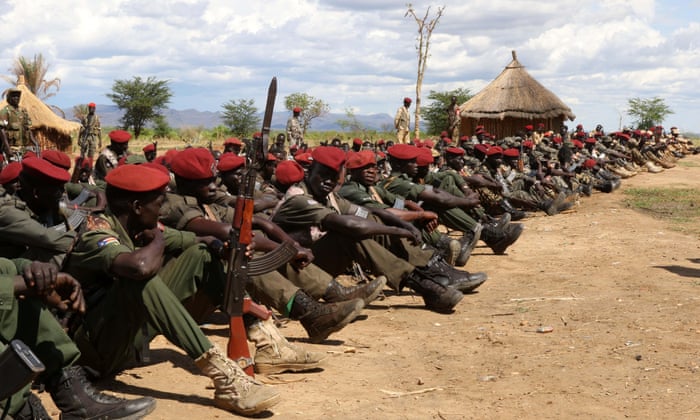Date: Fri, 15 Apr 2016 23:41:41 +0200
Uneasy progress towards peace in South Sudan as opposition troops arrive in Juba ahead of Riek Machar taking up vice-presidency

On the outskirts of Juba, along a dirt road just past the UN camp, opposition forces clad in new uniforms and boots lined up for a military parade. Several hundred strong, their presence seemed to suggest peace is finally taking hold in South Sudan.
“The arrival of the troops will show people that the opposition is committed to peace,” said Maj Gen James Koang Chuol, the rebel chief of staff, as he greeted his troops.
The rebels’ return to Juba, a government stronghold throughout the conflict, is a milestone in a peace process marred by delays and continued fighting.
Their presence is also a prerequisite for the arrival of the opposition leader, Riek Machar, scheduled for Monday 18 April. Machar is to take up his post as vice-president in the transitional government, which will ultimately pave the way for fresh elections.
But the proximity of the heavily armed government and opposition forces could also offer fertile ground for fresh tensions between two groups that don’t trust each other and regularly trade accusations of ceasefire violations.
The 1,370 opposition forces present in Juba will eventually form part of an 8,000-strong joint integrated military and police force drawn from both camps. All remaining forces are to be redeployed at least 25km outside Juba.
The withdrawal of troops is to reduce clashes among the armed forces, which is what sparked the slaughter that began on 15 December 2013 after President Salva Kiir, a Dinka, accused his then deposed deputy, Riek Machar, a Nuer, of plotting a coup.
An altercation between presidential guards loyal to the two men quickly spilled into widespread killings of members of the Nuer tribe, prompting Machar and his supporters to flee the capital and mobilise their own forces. As the fighting spread to the rest of the country, both sides – bolstered by groups of militias with ever shifting alliances – were accused of atrocities.
The number of troops remaining in the capital ahead of Machar’s arrival is unclear. The government army, the Sudan People’s Liberation Army (SPLA), claims nine battalions – almost 7,000 troops – have been redeployed outside Juba. The significance of this is hard to gauge, given that the original number of troops has never been disclosed, and independent monitors have yet to verify how many troops remain in the capital.
But even if the demilitarisation of Juba is completed, there is little guarantee the two camps will not fight again.

“We need to build confidence [between the government and opposition forces],” said Maj Gen James Ajongo Mawut, the deputy chief of staff of the government army, who chairs a joint committee charged with monitoring the ceasefire. “We are redeploying 25km [outside Juba] but even if it is one battalion remaining and again they clash, is it really difficult to come back to Juba?”
While the cantonment of troops may be a first step to end fighting, fundamental reforms of the security sector are needed to professionalise an army notorious for lack of discipline, human rights abuses and tribalism.
“The biggest challenge for the transformation of the security sector is the breakdown of central command and order,” said Beny Gideon, a lawyer who represents civil society on the Strategic Defence and Security Review board, a body established by the peace agreement to review the size and structure of the army.
“Many soldiers are not trained – they are only paying allegiance to the commanders who brought them in. And so the SPLA became an army formed along tribal lines, and it continues,” said Gideon.
The army’s unruly command structure has raised fears that hardliners could undermine the formation of the transitional government, concerns compounded by unverified reports of irregular troops being brought into Juba even as the government claimed to have finished withdrawing forces.
The army has denied splits within its ranks, but high-level sources said there wasn’t full support for the peace deal. “There’s a lot of confusion about the leadership in the SPLA, about who is actually in charge,” said a senior general in the army, who spoke on condition of anonymity. “Most people in the army feel like they stand to lose from accommodating the opposition so they will listen to those who oppose peace.”
South Sudan’s vast security forces have been an important source of employment and patronage, and any efforts to reform or downsize the army could face political opposition. Previous programmes to demobilise troops following the civil war with Sudan – by offering short-term vocational training, for example – have proved largely ineffective, raising questions about how such programmes should be structured and, crucially, who would fund them.
With the government facing a fiscal and monetary crisis, expectations are high that donors will foot the bill for much needed but politically sensitive security sector reforms and demobilisation, disarmament and reintegration programmes. “There’s an acceptance that it will be messy, but the risk of not supporting DDR programmes at all could be far graver given the high amount of weaponry around the country,” said a senior western diplomat based in Juba.
The government is hopeful of securing international funding for food and services to the thousands of soldiers who have started to assemble in cantonment sites. “What is going to be difficult is the international community being reluctant to support the process,” said Ajongo. “The people in the cantonment areas will be armed, and if you don’t give them services, they will become a source of insecurity.”
Despite hopes of peace, many South Sudanese are wary about the fragile security situation and fear the deep rifts left by the conflict may be hard to bridge. “Yesterday we were killing each other, today we are supposed to be together. I think that’s impossible,” said Anthony Gawar, a Nuer who used to drive tanks for the SPLA prior to the conflict.
When fighting erupted in Juba, Gawar abandoned the armed forces in fear of being targeted, fleeing to the UN’s protection of civilians site in Juba. Despite the presence of opposition forces and the redeployment of government troops outside Juba, Gawar has no plans to leave the camp.